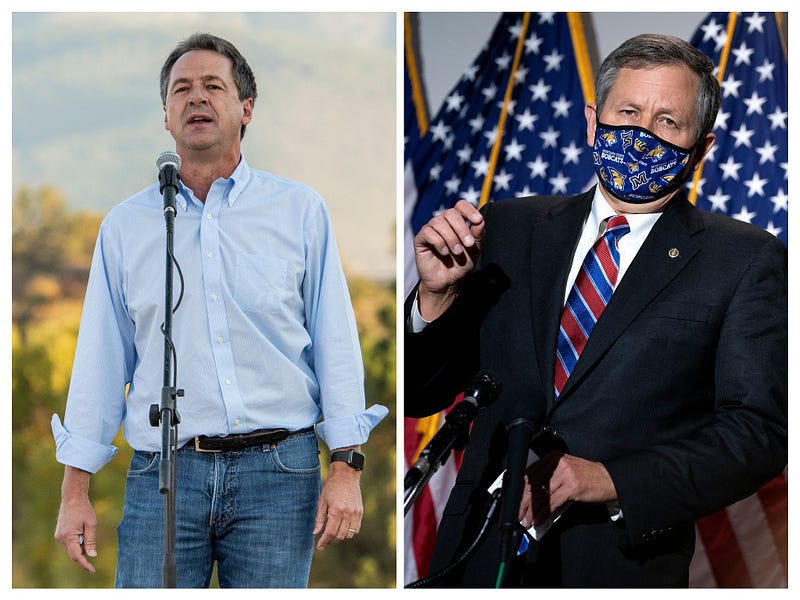President Trump is expected to win Montana tonight, but his margin of victory is likely to pale in comparison to his 56-36 victory over Hillary Clinton in the state in 2016. That could be potentially bad news for Republican Sen. Steve Daines, who is facing a closer-than-expected reelection challenge from two-term Democratic Gov. Steve Bullock.
Though Montana has consistently backed Republican presidents since 1968—with the exception of Bill Clinton in 1992—the state prides itself in its fiercely independent and populist voting behavior in down-ballot races. Montanans haven’t elected a Republican governor since Judy Martz in 2000, and in 2014, Steve Daines became the first Republican ever elected to his particular Senate seat.
Daines is hardly the only vulnerable GOP senator up for reelection this year, but the race is a little different from some of those other competitive races. For one, Daines and Bullock are both well-known and well-liked among Montana voters, and both candidates have had their foot in the door of Montana politics for quite some time.
Before winning a Senate seat in 2014, Daines served one term as Montana’s lone member of the House of Representatives, which helped boost his name recognition in a state with roughly 700,000 registered voters. “Daines is really one of the stronger Republicans to come out of that freshman class in 2014,” said J. Miles Coleman, associate editor of Sabato’s Crystal Ball at the University of Virginia’s Center for Politics. Coleman added that Daines—whom he dubbed a “generic Republican”—is not quite as “gaffe-prone” as vulnerable GOP incumbent Sens. Thom Tillis of North Carolina or Joni Ernst of Iowa.
But Daines is running against popular two-term governor and former attorney general Steve Bullock, who won his gubernatorial reelection campaign in 2016—albeit narrowly—the same year Trump won the Big Sky state by 20 points. He is hoping that Montana voters’ habit of splitting their tickets will boost his chances.
Following a failed bid for the Democratic presidential nomination last year, Bullock entered Montana’s race in late March amid pressure from top Democrats in Washington who are eager retake the Senate. “You have to have a Democrat that sort of fits that mold of Montana, and I’m not sure that there is another Democrat right now that would have been able to make this competitive except for Steve Bullock, which is why of course Democrats so heavily wooed him into the race,” Jessica Taylor, Senate and governors editor for the Cook Political Report, told The Dispatch.
Bullock is also the only sitting governor running for Senate, which adds an interesting spin on the race given the pivotal role governors have played during the COVID-19 crisis. “One thing that I think helped Bullock early on was that we really saw governors getting a lot of credit right at the beginning of the pandemic, really stepping up and filling a leadership vacuum that the White House had left,” Taylor said. Governors across the board—including Bullock—have seen their approval ratings spike during the pandemic.
Like North Dakota, Montana is a state that lends itself to retail politics: personality, personal connections, and state pride traditionally matter more than party labels. Senior Democratic Sen. Jon Tester used this strategy in 2018 against his Republican challenger Matt Rosendale, a state auditor who is a native of Maryland. In what became one of the most effective electoral slights in Montana’s political history, Tester’s campaign began referring to Rosendale as “Maryland Matt,” which immediately solidified the latter’s reputation as an outsider and ultimately doomed the GOP’s hopes of ousting the Democratic incumbent.
“That’s an angle that Jon Tester played against him very well,” Coleman said. “He’s the most Montana person on earth,” Coleman said.
But as much as this strategy worked in Tester’s favor in 2018, it’s unlikely to tip the scales one way or another this election cycle, especially considering state pride is the lifeblood of both candidates’ campaigns. Whereas Bullock describes himself as “a lifelong Montanan who has worked tirelessly to protect Montana’s way of life,” Daines maintains that he is a “fifth generation Montanan” who is “committed to putting Montana first as he works to bring real change to Washington.” So which Steve will pull through on election night?
Montana elections are notoriously difficult to forecast: it has same-day voter registration and it doesn’t register voters by party. While FiveThirtyEight’s election forecasting model gives Daines a 67 percent chance of keeping his seat—and Sabato’s Crystal Ball maintains that the race leans Republican—both RealClearPolitics and the Cook Political Report have labeled the race a toss-up.
But aside from two reputable polls from Public Policy Polling and Montana State University-Billings—which show the Democratic challenger in a 1 point lead—most polls show Daines in the lead. After all, it’s difficult to unseat an incumbent, and as J. Miles Coleman told The Dispatch, “there’s a certain type of mojo that Jon Tester had that Bullock may not have.”
Photographs by William Campbell/Getty Images and Stefani Reynolds/Getty Images).







Please note that we at The Dispatch hold ourselves, our work, and our commenters to a higher standard than other places on the internet. We welcome comments that foster genuine debate or discussion—including comments critical of us or our work—but responses that include ad hominem attacks on fellow Dispatch members or are intended to stoke fear and anger may be moderated.
With your membership, you only have the ability to comment on The Morning Dispatch articles. Consider upgrading to join the conversation everywhere.